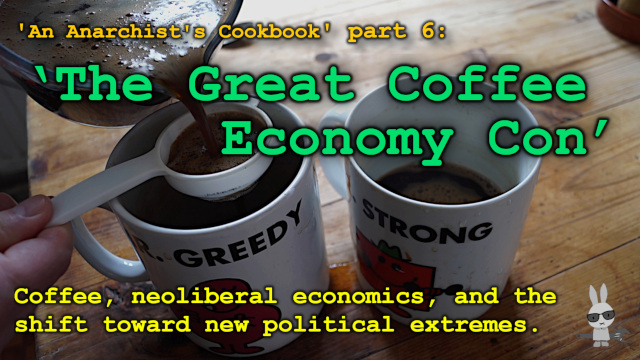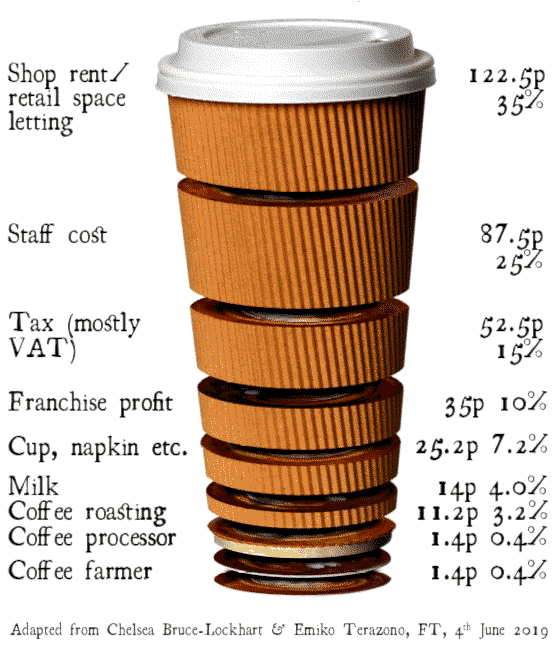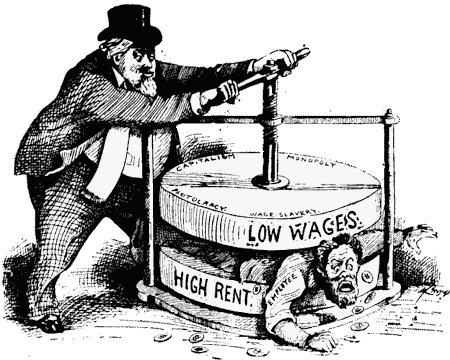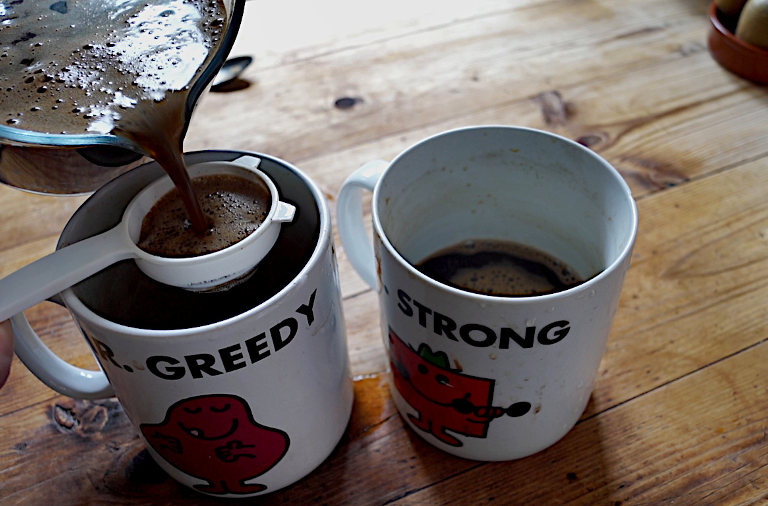Coffee, the addictive obsession of the affluent class, can tell us more about modern society than just retail trends; it is an indicator for how the modern neoliberal system operates, and its current shift toward new economic extremes.
As an ‘indulgence’ (which today has the opposite sense1 to its original meaning), coffee is a great indicator of food culture. If we pick the economics of that apart we can see how the debate about coffee, and who benefits from it, doesn’t reflect its exploitative economics2; and so perpetuates those trends.
With the current rail strikes – and before that, lockdown – the media have developed a habit of interviewing coffee shop proprietors to ask their views. Presumably because, for alleged ‘balance’, it’s a great way of securing a negative response to the industrial action that the Government’s agenda demands. But are the views of coffee shop owners truly representative?
I love coffee, but I can’t afford High Street coffee any more. In contrast, the media’s obsession with coffee, and its cost, has become emblematic of the affluent middle class lifestyle of the media itself – akin to its origins in the3 coffee shop culture of 370 years ago4 in the Seventeenth Century.
In this post I’m going to update some work5 I did pre-pandemic, to look at how the modern obsession with coffee reflects the deeper dominant ideology6 of our times.
In my home town, Banbury, coffee is in your blood – whether you drink it or not. Since the 1960s it has been home7 to the largest instant coffee plant8 in Europe. They roast coffee beans, make coffee, then spray-dry it to create instant coffee. The town often drips with the smell of coffee, and the river ran brown with its effluent.

Ramblinactivist video 2022/23. ‘The Great Coffee Economy Con’, Lammas 2022 (click for YouTube video)
All that changed in the 1990s. The economics of coffee retailing shifted, and as a result, people developed a taste – or should that be, ‘habit’9 – for ‘fresh’ coffee. New coffee shops sprang-up, with industrial coffee machines that could pump-out exotic coffees on demand. ‘Choice’ became the cult selling point, a ‘narcissism of small differences’10, to the point where ordering a round of coffees became a memory test challenge.
The modern cult of coffee, and its place in an increasingly unequal, polarised world, and its use within food culture as a measure of acceptable affluence, needs to be exposed!
Food banks versus coffee shops
I know it’s fashionable to use11 the metric of McDonald’s stores (1,300) versus food banks12 (>2,500). Why not compare to the number of Greggs13 (~2,200), given those shops are more ubiquitous in High Streets and shopping centres?
In practise, both Greggs and McDonald’s sell basic, low cost, hence low quality food that is affordable to most people. From the perspective of food inequality, coffee shops are a critical choice because they sell a culturally refined, artificially inflated product, outside the price-range of many people – again, highlighting the media’s myopia over the growing ‘underclass’ divide in society.
In 2021, in terms of the expensive branded coffee chains, there were over 9,500 outlets14 – almost four times more than the number of food banks. Collectively the major chains turned over £4.4 billion in 2021, recovering most of their pandemic losses. Even though, as a result of various factors, the prices for coffee15 are now in the range of £3 to £4.
ONS data shows16 in 2021 the richest 10% spent twice as much on food and non-alcoholic drinks as the poorest 10% – reflecting the higher price paid not simply the volume consumed.
“Follow the money”
The popular debate over the price of a cup of coffee has become an exercise in virtue signalling23; it has little to do with the politics and economics at the root of the issue.
Britain has some of the most concentrated, long-term land ownership27 in the world. Much of it is rural, but a significant concentration exists within certain urban land-uses – predominately housing and retail property.
Early economists were pretty scathing of “rent seeking” activity28 in the economy. It levies a charge on the economy to use assets, while often doing little to create new economic value in return for that ‘unearned’ wealth.
The price of a cup of coffee shows how neoliberal economics dominate society, and how that economic debate steers towards certain consumer issues, and away from the structural inequality it creates within national economies.
At the global level29 economics has become – through institutions like the World Bank, IMF and WTO – a new form of colonialism30 based around the monopoly control of key commodities; like oil, wheat, or coffee. Instead of a ‘physical’ colonialism, imposed by a particular nation, it is an ideological form of colonialism, where a set of ideas and values dominate through an economic lobby irrespective of nationality or state.
If we look at the corporate structures surrounding expensive coffee shops, they reflect the deepest values of neoliberalism31: Of unfair trade practices, both nationally and globally; authoritarian practices in the operation of those businesses – such as off-shoring or their opposition to unionisation32; and by extension, pushing those values out into the wider world through unfair contracting, franchising, and political lobbying practices.
Figures from the British Property Federation33 (for 2017) show that just over half of commercial property in Britain is owned by investment companies; and of that £486 billion of investment property almost a third, £183 billion, is owned by off-shore investment companies.
The results of a 2019 survey34 (adapted for 2022 prices) of a £3.50 High Street cup of coffee – and where those costs may go

That means it’s not just the profits from selling the coffee34 itself that are spirited away35, off-shore, by some of the36 leading coffee chains. The profits from the property they operate within are just as likely to be sent off-shore, untaxed, through the operation of physical- or intellectual property-holding companies37 in tax havens. And while the media have occasionally mention the 35p (10%) that may be going off-shore from the coffee chain, they do not mention the up to £1 or more (35%) that might be off-shored by the retail property owner (see chart).
How can you expect to defeat these practices when those same principles38 are at work in our daily life? The price of that cup of coffee is emblematic because it ‘normalises’ practices such as exploitative franchising contracts, the zero hours employment culture, the oligopoly of corporations who control of retail property, and the exploitative international commodity trading system.
Expensive coffee from coffee chains internalises the core values of neoliberalism: Through the direct exploitation of workers in the supply chain; more widely, through the social effects39 of their low-pay/tax-avoiding business, creating poverty across the nation; and the political culture normalised by these practices.
The economics of ‘Own Made’ coffee
The simple alternative to ‘shop bought’ coffee is to ‘do-it-yourself’. This creates a problem: Coffee doesn’t grow on trees – not in temperate climates!
It’s really difficult to buy raw (yellow/green) beans and roast them yourself42. That market is almost exclusively a commercial one. The few providers offering raw beans tend to charge a premium, as it’s a niche market aimed at coffee obsessives. And the mechanics of trying to import your own beans, direct from growers, tangles you in the stark reality of how ‘unfair’ trade really is, because it is skewed towards the needs of the bulk commodity system. E.g., it‘d only really be ‘economic’ to import a 20-tonne container-full.
For those who like their drugs to be ‘ethical’43, that usually adds around 20% to the cost of beans or ready-ground bags. Even then, there are issues over how fair ‘fair trade’ is, as the processing and packaging plant is usually not based in the country of origin; meaning that most of the ‘surplus value’44 doesn’t flow to the producing nation.
Buying ready-roasted whole beans saves a small amount – usually no more than 15% to 25%. Again, though, often there is no saving as it’s a market directed towards people with expensive coffee machines, or who obsessively grind their own. It also assumes that you have the ability to easily grind them yourself; though the positive aspect of ‘grind-it-yourself’ is that the beans give more of a flavourful hit, as the volatile oils do not evaporate as easily from beans as they do from the ready-ground coffee.
For the average person, though, buying ready-ground coffee is going to be the simplest option. Here the market has standardised around roughly quarter-pound/227 gram bags. The only practical option for bulk buying is to wait for a special offer in the supermarket, then buy a huge amount in a single purchase – stockpiling the bags until the next special offer comes along (that’s often cheaper than buying on-line).
Even the relatively more expensive ‘bag’ option shows just how much money is extracted from the public via coffee shops when we do the sums:
In summary then, shop-bought coffee is twelve times more expensive than you might reasonably pay for a good ‘DIY’ brew. If you were to buy a stainless-steel Thermos and carry it with you, you’d pay for the flask with the money saved the second time you filled it!
“Just give me the coffee!!”
I know: All you desperately need is coffee so that you can minimally function in this mad mad world. I too can empathise with that! So why am I trying to complicate your caffeine habit with insights into neoliberal economics?

‘The Condition of Laboring Man at Pullman’ (1894)
Apart from Tory MPs, it is difficult to think of anyone who thinks food banks are a good idea. Yes, they are objectively ‘good’ compared to allowing 3 million people to starve; but the fact is they shouldn’t need to exist in a country as rich as ours. The reason they do exist is because of the economic dogma that all major political parties worship, and how that has progressively impoverished people across Britain.
If you want to break that then you have to act; and a cost-effective way to exclude the most rapacious business practices which extort money from the public is to boycott the expensive chain coffee shops. This trade is ‘unfair’ not just because of the exploitation of the coffee growers. Both the purchaser and the farmer are being conned by that same neoliberal economic system – and unless you recognise that you won’t change it.
Right now, led by Britain and the US, the right-ward shift in national politics – assisted by the economic disruption wrought by the libertarian billionaires of Silicon Valley – is driving a new wave of extreme neoliberal economics. Some actually label this, ‘neofeudalism’45, due to the level of economic power taken from average person and given to corporations and billionaires.
This new authoritarian neoliberalism is not a departure from the policies of Reagan and Thatcher forty years ago. It is actually more in line with the ‘pure’ neoliberal theory that was first dreamt of by right-wing think-tanks in the Sixties and Seventies. Though its political supporters rhetorically speak of ‘free markets’, instead this new right-wing orthodoxy seeks to reorganise society in a coercive, non-democratic, and unequal way: From cutting red tape to removing protest rights, this is the goal of the political Right.
The true economic divide is not between consumers in the ‘developed world’ and poor farmers in the ‘developing world’. The divide is between those who must work (coffee shop owners included!), and taking ‘unearned’ profits from assets which should be co-operatively owned by society.
Households are central to the resistance to neoliberalism, and to the neoliberal world-view in general. Resistance doesn’t begin with throwing bricks; it begins when you refuse to live as directed by this economic scam. To make a start, just brew your own coffee! After that, everything else is negotiable.
Endnotes:
1. Wikipedia:
‘English Coffeehouses, Penny Universities’.
2. Ethical Consumer:
‘London’s Original and All-Inspiring Coffee House’.
3. Historic UK: ‘The untold story about a cup of High Street coffee’, 2019.
4. Atlas Obscura:
‘Dominant ideology’.
5. Free Range Network:
‘Indulgence’.
6. Wikipedia:
‘Coffee and beans’.
7. Wikipedia:
‘Kraft Foods Banbury’.
8. Wikipedia:
‘Instant coffee’.
9. Wikipedia:
‘Caffeine dependence’.
10. Wikipedia:
‘Narcissism of small differences’.
11. Huff Post UK:
‘Iceland Boss Points Out UK Has More Food Banks Than McDonald’s Branches’, 24th September 2021.
12. Independent Food Aid Network: ‘Mapping the UK’s Independent Food Banks’.
13. Scrape Hero:
‘Number of Greggs locations in the UK in 2022’.
14. World Coffee Portal: ‘UK coffee chains achieve £1.3bn sales rebound as outlets exceed pre-Covid levels’, 20th January 2022.
15. Mirror On-line: ‘Cost of high-street coffee set to rise by 30 per cent due to ‘extreme weather’’, 15th January 2022.
16. Office ofr National Statistics:
‘Family spending workbook 2 – expenditure by income’, 18th July 2022.
17. Trussell Trust: ‘Food banks provide more than 2.1 million food parcels to people across the UK in past year, according to new figures released by the Trussell Trust’, 27th April 2022.
18. Mirror On-line: ‘Food bank charity hands out emergency parcel every 13 seconds as demand soars’, 24th July 2022.
19. Big Issue: ‘Food poverty in the UK – The causes, figures and solutions’, 20th June 2022.
20. FareShare: ‘What we do’.
21. FareShare: ‘Annual Report 2020/21’, December 2021.
22. FareShare:
‘FareShare continues to deliver 4 meals every second to struggling UK families, as cost of living bites’, 27th May 2022.
23. Wikipedia:
‘Virtue signalling’.
24. Fairtrade Foundation:
‘Coffee Farmers’.
25. Journal of Consumer Ethics:
‘From bean to cup and beyond – exploring ethical consumption and coffee shops’, vol.2 no.2 pp.34-47, November 2018.
26. World Economic Forum:
‘From plant to paper cup – The economics of coffee in one chart’, 28th October 2020.
27. Guardian On-line:
‘Half of England is owned by less than 1% of the population’, 17th April 2019.
29. YouTube: ‘Colonialism Never Ended – Neo-Colonialism, Semi-Colonies & Bureaucrat Capitalism’, February 2022.
30. Wikipedia:
‘Neocolonialism’.
31. Globalisations:
‘Framing the neoliberal canon – resisting the market myth via literary enquiry’, vol.16 no.3 pp.245-259, 2019.
32. Wikipedia:
‘Starbucks unions’.
33. British Property Federation:
‘Property Data Report 2017’, October 2017.
34. FT: ‘From bean to cup, what goes into the cost of your coffee?’, 4th June 2019.
35. Guardian On-line:
‘Wealth doesn’t trickle down – it just floods offshore, research reveals’, 21st July 2012.
36. Mail On-line: ‘As small firms are hammered by a tax hike, guess what – the big boys including Starbucks, Gap and Apple are still getting away with murder’, 21st March 2017.
37. YouTube:
‘McDonald’s $3.4 Billion IOU To Itself’, 22nd April 2022.
38. YouTube: ‘My Clothes Tell A Story of Greed’, June 2022.
39. Guardian On-line:
‘It’s not the hungry who gain most from food banks – it’s big business’, 25th March 2019.
40. Critical Social Policy:
‘The growth of food banks in Britain and what they mean for social policy’, vol.39 no.1 pp.3-22, 2019.
41. Journal of Sociology and Social Welfare:
‘Globalization, precarious work, and the food bank’, vol.35 no.2 pp.9-28, June 2008.
42. DIY Natural:
‘Five Ways To Roast Your Own Coffee At Home’, 2018.
43. Fairtrade Foundation:
‘Coffee’.
44. Wikipedia:
‘Surplus value’.
45. Wikipedia:
‘Neo-feudalism’.
© 2022 Paul Mobbs; released under the Creative Commons license.
Teaser photo credit: Author supplied.





